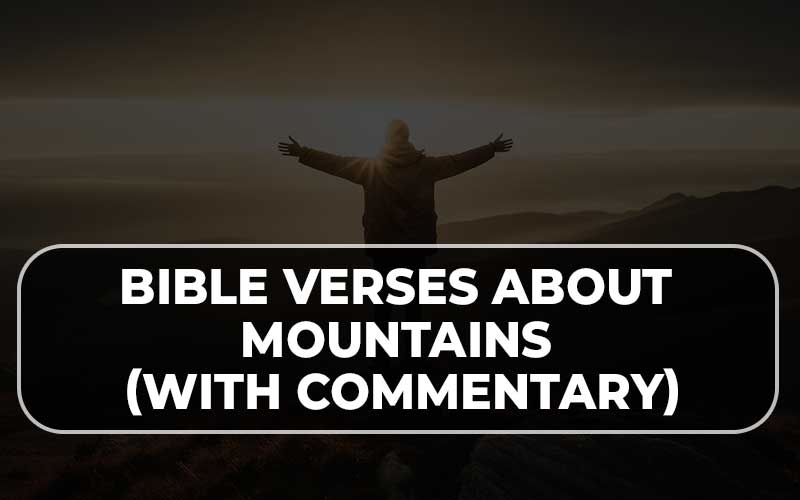Mountains hold a special place in the biblical narrative, serving as more than just geographical features. They are often infused with symbolic meaning, representing encounters with God, places of refuge, and the triumph of faith over obstacles.
In this exploration, we delve into 25 Bible verses about mountains, accompanied by insightful commentaries that unravel the spiritual significance woven into these elevated terrains.
Bible Verses About Mountains
Genesis 8:4
“And in the seventh month, on the seventeenth day of the month, the ark came to rest on the mountains of Ararat.”
In this verse, the mountains of Ararat signify a place of safety and deliverance. After the flood, the ark finds its resting place on the elevated terrain, emphasizing God’s providence and the symbolic significance of mountains as a refuge.
Psalm 121:1-2
“I lift up my eyes to the hills. From where does my help come? My help comes from the Lord, who made heaven and earth.”
The psalmist acknowledges the majesty of mountains and, in doing so, recognizes the ultimate source of help—God, the Creator of the heavens and the earth. Mountains serve as a reminder of God’s sovereign power and assistance.
Isaiah 2:2
“It shall come to pass in the latter days that the mountain of the house of the Lord shall be established as the highest of the mountains, and shall be lifted up above the hills; and all the nations shall flow to it.”
Prophesying about the future, Isaiah speaks of the exalted status of the mountain of the Lord’s house, symbolizing the prominence of God’s kingdom among all nations.
Matthew 17:1-2
“And after six days Jesus took with him Peter and James, and John his brother, and led them up a high mountain by themselves. And he was transfigured before them, and his face shone like the sun, and his clothes became white as light.”
The transfiguration of Jesus on the high mountain reveals a divine manifestation, illustrating the sacred nature of elevated places in encounters with God.
Psalm 125:1-2
“Those who trust in the Lord are like Mount Zion, which cannot be moved, but abides forever. As the mountains surround Jerusalem, so the Lord surrounds his people, from this time forth and forevermore.”
Mount Zion symbolizes stability and enduring security. Trust in the Lord is likened to this unshakable mountain, emphasizing the continuous protection that surrounds God’s people.
Psalm 90:2
“Before the mountains were brought forth, or ever you had formed the earth and the world, from everlasting to everlasting you are God.”
This verse underscores the eternal nature of God, predating the formation of mountains. Mountains, as enduring features of the earth, serve as a temporal reference to emphasize God’s everlasting existence.
Isaiah 54:10
“For the mountains may depart and the hills be removed, but my steadfast love shall not depart from you, and my covenant of peace shall not be removed,” says the Lord, who has compassion on you.”
The impermanence of mountains is contrasted with the everlasting nature of God’s steadfast love and covenant of peace. This verse emphasizes the reliability of God’s promises.
Psalm 98:8
“Let the rivers clap their hands; let the hills sing for joy together.”
This poetic imagery portrays a vibrant creation where even the hills join in the chorus of joy. Mountains are depicted as active participants in praising the Creator.
Exodus 19:3-4
“Moses went up to God, and the Lord called to him from the mountain, saying, ‘Thus you shall say to the house of Jacob, and tell the people of Israel: You yourselves have seen what I did to the Egyptians, and how I bore you on eagles’ wings and brought you to myself.'”
God’s call to Moses from the mountain signifies a divine encounter, establishing a connection between the elevated place and God’s redemptive acts for the people of Israel.
Psalm 65:6
“By your strength, you established the mountains; you are girded with might.”
This verse acknowledges God as the source of strength who established the mountains. The imagery emphasizes the divine power inherent in the creation of elevated terrains.
Matthew 21:21
“And Jesus answered them, ‘Truly, I say to you, if you have faith and do not doubt, you will not only do what has been done to the fig tree but even if you say to this mountain, ‘Be taken up and thrown into the sea,’ it will happen.'”
Jesus uses the metaphor of moving mountains to illustrate the transformative power of faith. Mountains, often seen as obstacles, become symbols of surmountable challenges through unwavering belief.
Psalm 97:5
“The mountains melt like wax before the Lord, before the Lord of all the earth.”
The image of mountains melting like wax emphasizes the supreme authority of the Lord over the natural elements, portraying God’s dominion over creation.

Psalm 148:9
“Mountains and all hills, fruit trees and all cedars!”
This verse includes mountains in a list of created entities called to praise the Lord. Mountains are seen as participants in the universal chorus of praise.
Zechariah 14:4
“On that day his feet shall stand on the Mount of Olives that lies before Jerusalem on the east, and the Mount of Olives shall be split in two from east to west by a very wide valley, so that one half of the Mount shall move northward, and the other half southward.”
Prophesying about the Messiah, Zechariah describes a monumental event involving the Mount of Olives. This imagery highlights the divine significance associated with specific mountains.
Psalm 114:4
“The mountains skipped like rams, the hills like lambs.”
This poetic description portrays a dynamic creation where mountains and hills exhibit lively movements, emphasizing the awe-inspiring nature of God’s creative power.
Micah 6:1-2
“Hear what the Lord says: Arise, plead your case before the mountains, and let the hills hear your voice. Hear, you mountains, the indictment of the Lord, and you enduring foundations of the earth, for the Lord has an indictment against his people, and he will contend with Israel.”
Mountains are called as witnesses in a metaphorical court setting, symbolizing the enduring nature and stability of these terrains as listeners to God’s indictment.
Psalm 50:10
“For every beast of the forest is mine, the cattle on a thousand hills.”
God’s ownership of the cattle on a thousand hills emphasizes His sovereignty over all creation, using mountains as a symbol of abundance and vastness.
Zechariah 4:7
“Who are you, O great mountain? Before Zerubbabel, you shall become a plain. And he shall bring forward the top stone amid shouts of ‘Grace, grace to it!'”
This verse employs the metaphor of a great mountain becoming a plain to symbolize the removal of obstacles and the triumph of God’s grace in achieving His purposes.
Psalm 50:11
“I know all the birds of the hills, and all that moves in the field is mine.”
God’s knowledge and ownership of all creatures in the hills further reinforce His comprehensive authority over the entirety of creation.
Mark 11:23
“Truly, I say to you, whoever says to this mountain, ‘Be taken up and thrown into the sea,’ and does not doubt in his heart, but believes that what he says will come to pass, it will be done for him.”
Similar to Matthew 21:21, this verse underscores the transformative power of unwavering faith, using the moving of mountains as a metaphor for overcoming challenges.
Psalm 65:12
“The pasturelands of the wilderness overflow, and the hills gird themselves with joy.”
The imagery of hills girding themselves with joy portrays a harmonious and joyful creation. Mountains are depicted as active participants in the celebration of God’s abundance.
Isaiah 41:15
“Behold, I make of you a threshing sledge, new, sharp, and having teeth; you shall thresh the mountains and crush them, and you shall make the hills like chaff.”
This vivid imagery depicts God empowering His chosen instrument to overcome and conquer obstacles, symbolized by threshing the mountains and reducing the hills to chaff.
Psalm 87:1
“On the holy mount stands the city he founded;”
The reference to the holy mount highlights its significance as the location of the city founded by God. Mountains are associated with sacred spaces and divine establishments.
Nahum 1:5
“The mountains quake before him; the hills melt; the earth heaves before him, the world and all who dwell in it.”
The portrayal of mountains quaking and hills melting signifies the profound impact of God’s presence and power on the natural elements, illustrating His supreme authority.
Revelation 6:14
“The sky vanished like a scroll that is being rolled up, and every mountain and island was removed from its place.”
In the apocalyptic vision of Revelation, the dramatic imagery of mountains being removed emphasizes the cosmic upheaval that accompanies the unfolding of God’s divine plan.
These “25 Bible Verses About Mountains” and their commentaries provide insights into the diverse symbolic meanings attributed to mountains in the Bible.
From serving as places of refuge to symbolizing obstacles overcome through faith, mountains convey rich spiritual truths throughout Scripture. May these verses inspire contemplation on the profound significance of elevated terrains in the biblical narrative.
Also Read: Bible Verses About Rocks (With Commentary)

